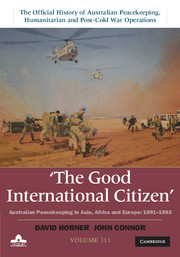Book contents
- Frontmatter
- Contents
- Maps
- Preface
- Chronology 1989–99
- Abbreviations
- Part 1 Strategy and policy
- 1 Peacekeeping after the Gulf War
- 2 Peacekeeping in the new world disorder
- Part 2 Cambodia
- Part 3 Western Sahara
- Part 4 Former Yugoslavia
- Part 5 Watch on Iraq
- Appendix A United Nations Security Council resolutions
- Appendix B Major office bearers, 1991–99
- Bibliography
- Index
- Plate section
- References
1 - Peacekeeping after the Gulf War
Australian defence policy, 1991
from Part 1 - Strategy and policy
Published online by Cambridge University Press: 12 May 2022
- Frontmatter
- Contents
- Maps
- Preface
- Chronology 1989–99
- Abbreviations
- Part 1 Strategy and policy
- 1 Peacekeeping after the Gulf War
- 2 Peacekeeping in the new world disorder
- Part 2 Cambodia
- Part 3 Western Sahara
- Part 4 Former Yugoslavia
- Part 5 Watch on Iraq
- Appendix A United Nations Security Council resolutions
- Appendix B Major office bearers, 1991–99
- Bibliography
- Index
- Plate section
- References
Summary
This volume describes the six Australian overseas peacekeeping missions that began in the year after the Gulf War ended in March 1991. All were initiated to enhance Australia's status as an international good citizen. The first of these missions was to Cambodia. In the mid-1980s the Australian Foreign Minister, Bill Hayden, had tried to resolve the conflict in Cambodia, where Vietnamese troops had been supporting a puppet regime since their 1979 invasion, but it was not until the end of the Cold War that a solution seemed possible. Vietnam began withdrawing troops from Cambodia in 1987 and, as support from the Soviet Union waned, completed the task in 1989. That year Senator Gareth Evans, who had succeeded Hayden as Foreign Minister, undertook diplomatic initiatives that contributed substantially to the signing of an agreement in Paris in October 1991 to facilitate UN-organised elections for a new Cambodian government. An Australian signals detachment arrived in Cambodia in November 1991. The contingent grew in size in 1992, before returning to Australia in 1993 after the successful conduct of the election.
The second mission was to Western Sahara, where there was a long-running conflict between Morocco and the Sahrawi national liberation movement, Polisario. The initiative for the mission owed less to the end of the Cold War than had been the case with Cambodia. Rather, the success of the UN mission in Namibia in 1989–90 (described in volume 2, Australia and the ‘New World Order’) encouraged the UN Secretary-General, Javier Pérez de Cuéllar, that he could achieve a similar outcome in Western Sahara. In July 1990 the Australian Defence Minister, Senator Robert Ray, approved the despatch of Australian military personnel as observers. This deployment did not eventuate, but an Australian officer took part in a UN technical mission later that year, and Australian signallers began arriving in September 1991. The last Australian contingent returned to Australia in 1994 when it was clear that the UN mission was not achieving its aims. Good international citizenship had its limits.
- Type
- Chapter
- Information
- The Good International CitizenAustralian Peacekeeping in Asia, Africa and Europe 1991–1993, pp. 3 - 15Publisher: Cambridge University PressPrint publication year: 2014

